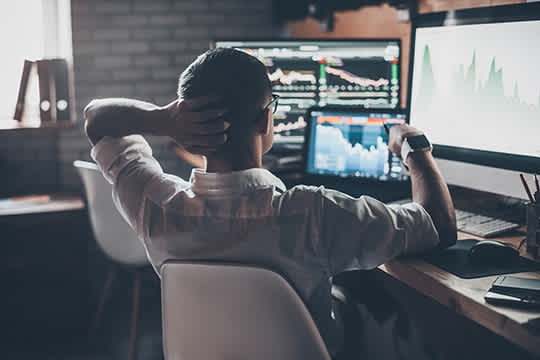6 points to consider for thematic investing
Keytrade Bank
keytradebank.be
July 23, 2021
6 minutes to read
Investing in thematic funds and/or trackers (ETFs) is a popular way of diversifying a portfolio. Unlike funds that focus on a specific sector (such as healthcare, banks or automotive), thematic funds often invest across multiple sectors. A fund focusing on the theme of "security" may invest in infrastructure (the fence around your property) and services (the security firm). However, it may also invest in tech companies (your secure online login), insurance companies (the theft insurance for your bike), consumer goods (your safety shoes for doing DIY jobs) and even everything to do with food safety.
Thematic funds allow you to diversify and to add a personal touch to your portfolio. You can have targeted investments in areas that are close to your heart (such as climate change) or that you think may outperform the general market average.
The range of thematic funds and trackers has grown considerably in recent years from artificial intelligence to ageing populations, robotics and gender diversity. However, it is important not to let yourself be dazzled by their appeal and to have a proper look at everything that is involved. Some points to consider.
1. Ensure a solid foundation
Although thematic funds are often about promising opportunities, they can also go wrong for you. A report by Morningstar has shown that between January 1996 and June 2020, more than half of thematic funds (with active and passive management) no longer existed after 10 years. A fifth of all thematic funds even shut down after just two years. Although they often start off with great ambitions, they do not always meet expectations. Of all the thematic funds that were set up before 2010, only a quarter outperformed the MSCI World index between 2010 and 2020.
This is also the reason why you should be selective and not build your portfolio with thematic funds alone. Although the potential return on thematic investments is high, the potential loss is equally high.
For most investors wishing to invest in themes it is therefore advisable to first lay a broad and diverse foundation of, say, balanced funds and/or trackers of the main indices. Because thematic funds often have concentrated portfolios and relatively low chances of survival, it is best to invest in them only to add some accents to your portfolio.
2. Distinguish niche funds from thematic funds
Some thematic funds try to capitalise on the flavour of the month, whatever that flavour may be: cannabis, battery storage, obesity, gene therapy, you name it. Sometimes that is one of the reasons for their short life span. Thematic funds with a strong focus on a certain niche market (such as wind turbines and solar panels) may perform much better than theme funds that take a somewhat broader approach (for example smart and renewable energy). However, thematic funds operating in a single niche market can also get cornered very quickly when things don't go so well. If a thematic fund's strategy states that it can only invest in wind turbines and solar panels, it can't simply start investing in electric cars.
It may therefore be sensible to choose a thematic fund that focuses on various sub-themes within one larger, broader investment theme (wind turbines and solar panels, but also energy efficiency, smart energy networks, electric vehicles, battery storage and so on). This limits the concentration risk and still allows you to respond to an interesting theme. According to Morningstar, the average thematic fund has almost half of its assets allocated to its 10 largest holdings. So be aware of the potentially high concentration risk, carefully read the key investor information document and consult the fund manager’s website for more background details.
3. Choose a thematic fund that may also benefit from one or several mega trends
You can assume that some themes will have a longer shelf life than others. You may therefore prefer themes that are closely linked to one or more mega trends, such as digitality, global warming, urbanisation, social and demographic trends and the rise of Asia.
4. Widen your horizons beyond the pure players
Does Facebook belong in a thematic fund on Artificial Intelligence (AI)? Or does agricultural machinery manufacturer John Deere belong in a thematic fund on space travel? It all depends on how you and the fund manager see things.. Tractors don't seem to have much to do with space travel, but the roll-out of satellites can help to further develop precision farming and self-driving agricultural vehicles. The same applies to Facebook: although strictly speaking Facebook is not an AI player, it does use AI to develop its services (and generate revenue).
If you want to invest in a thematic fund (or tracker), it may be useful to look at its strategy and composition (if accessible). Does the fund focus solely on pure players? Or does it include companies that may also benefit as the theme continues to evolve?
5. Everything that applies to conventional funds also applies to thematic funds
The fund's track record, the fund manager's experience, the fund's size (assets under management), the years the fund has been active,... All the selection criteria that apply to conventional funds also apply to thematic funds.
6. Passive or active management?
For most themes, you can choose an actively managed fund or a (passive) tracker. Both have their advantages and disadvantages.
A tracker is cheaper than an actively managed fund, but is generally not selective. A tracker follows all the shares in a certain index. This includes shares that are performing less well or have less positive growth prospects.
An actively managed fund is more expensive than a tracker, but the fund manager can choose from a whole universe of shares to find exactly those shares he or she thinks have most potential.
Getting started with thematic investing?
At Keytrade Bank, you can opt for thematic funds as well as trackers. Log into your account and discover the range.

